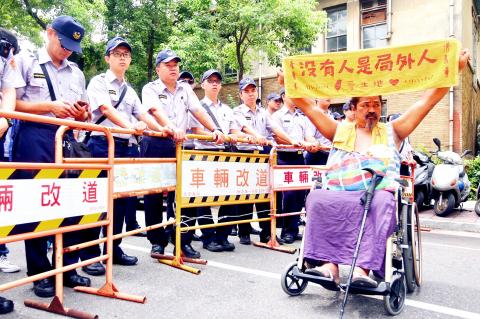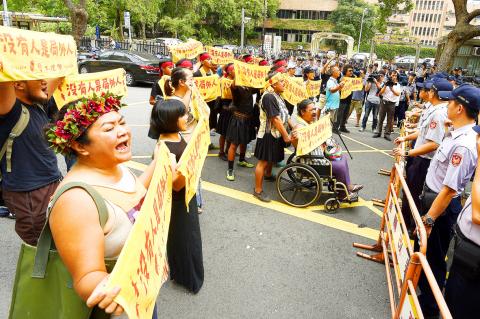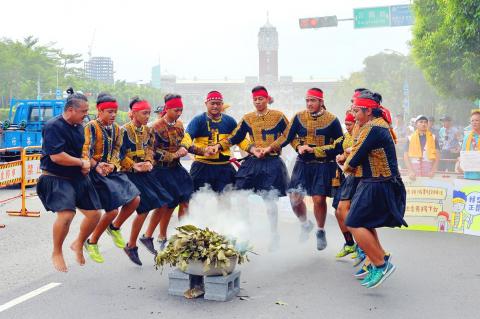Aboriginal rights campaigners yesterday condemned the government for having not carried out a promise to reinstate traditional Aboriginal territories, and they demanded that an independent agency be established to restore Aboriginal rights to land and transitional justice.
President Tsai Ing-wen (蔡英文) on Aug. 1 last year delivered a landmark apology to Taiwan’s Aborigines for their deprivation of rights in the hundreds of years since the mass migration of Han people began.
She promised to reinstate land rights, self-determination, economic development, cultural and language preservation and other rights protection.

Photo: CNA
Tsai yesterday said the government has worked to preserve Aboriginal languages and culture by immersing Aboriginal preschoolers and students in a learning environment where their native languages are spoken.
Aboriginal campaigners who have been staging a camp-out near the Presidential Office Building in Taipei for 160 days said Tsai had failed to keep her promises to restore Aboriginal rights.
They criticized the guidelines the Cabinet released on Feb. 14 on the delineation of traditional Aboriginal territories, which would restrict the application of the “traditional area” label to government-owned land, explicitly excluding private land.

Photo: Chen Chih-chu, Taipei Times
It would reduce recognized traditional territories from 1.8 million hectares to 800,000 hectares while companies would be allowed to develop traditional Aboriginal land that is now in private hands without the consent of local Aborigines, they said.
“Tsai promised that the government would prioritize the issue of traditional territories, but it turns out it is only limited to government-owned land,” Amis activist Panai Kusui said.
Documentary filmmaker Mayaw Biho, an Amis who has been an active member of the camp-out, called on the government to legislate an Aboriginal transitional justice law and establish an agency similar to the Cabinet’s Ill-gotten Party Assets Settlement Committee to investigate the deprivation of Aboriginal rights.

Photo: CNA
That would be a way to achieve understanding and reconciliation, he said.
The Presidential Office’s Indigenous Historical Justice and Transitional Justice Committee, which was established last year to understand the history of Aboriginal rights deprivation and reinstate those rights, does not have the necessary executive or investigative powers to perform its functions, Mayaw said.
“It is an irresponsible reform if the ruling party acts like it has done a lot and put in a great deal of effort in an effort to convince the public it is trying to tackle a problem,” Sunflower movement leader Lin Fei-fang (林飛帆) said.
Lin criticized Presidential Office Deputy Secretary-General Yao Jen-to (姚人多) and Democratic Progressive Party Legislator Kolas Yotaka for saying that the protesters do not respresent the nation’s Aborigines.
“Why can a person in power [Yao] be so careless about his authority, but treat protesters in quite a different way? What is the difference between the government and the Chinese Nationalist Party [KMT]?” Lin said.
The Executive Yuan said that efforts are under way to provide further protection to Aboriginal languages, land and resource rights.
The president has held talks with Aboriginal delegates, and the traditional territories delineation guidelines and landmark Aboriginal Language Development Act (原住民族語言發展法) have been promulgated, while legal rulings have been made to ensure that Aborigines could practice traditional hunting, fishing and harvesting, the Executive Yuan said.
The Cabinet has also completed the preliminary investigation into a government decision to deposit nuclear waste on Orchid Island (蘭嶼, Lanyu) without the knowledge and consent of the local Tao community when Chiang Ching-kuo (蔣經國) and Sun Yun-suan (孫運璿) were premier.
The Cabinet will create an institutional environment for the development of Aboriginal cultures and achieve transitional justice and harmony between ethnic groups, the Executive Yuan said.

The CIA has a message for Chinese government officials worried about their place in Chinese President Xi Jinping’s (習近平) government: Come work with us. The agency released two Mandarin-language videos on social media on Thursday inviting disgruntled officials to contact the CIA. The recruitment videos posted on YouTube and X racked up more than 5 million views combined in their first day. The outreach comes as CIA Director John Ratcliffe has vowed to boost the agency’s use of intelligence from human sources and its focus on China, which has recently targeted US officials with its own espionage operations. The videos are “aimed at

STEADFAST FRIEND: The bills encourage increased Taiwan-US engagement and address China’s distortion of UN Resolution 2758 to isolate Taiwan internationally The Presidential Office yesterday thanked the US House of Representatives for unanimously passing two Taiwan-related bills highlighting its solid support for Taiwan’s democracy and global participation, and for deepening bilateral relations. One of the bills, the Taiwan Assurance Implementation Act, requires the US Department of State to periodically review its guidelines for engagement with Taiwan, and report to the US Congress on the guidelines and plans to lift self-imposed limitations on US-Taiwan engagement. The other bill is the Taiwan International Solidarity Act, which clarifies that UN Resolution 2758 does not address the issue of the representation of Taiwan or its people in

US Indo-Pacific Commander Admiral Samuel Paparo on Friday expressed concern over the rate at which China is diversifying its military exercises, the Financial Times (FT) reported on Saturday. “The rates of change on the depth and breadth of their exercises is the one non-linear effect that I’ve seen in the last year that wakes me up at night or keeps me up at night,” Paparo was quoted by FT as saying while attending the annual Sedona Forum at the McCain Institute in Arizona. Paparo also expressed concern over the speed with which China was expanding its military. While the US

SHIFT: Taiwan’s better-than-expected first-quarter GDP and signs of weakness in the US have driven global capital back to emerging markets, the central bank head said The central bank yesterday blamed market speculation for the steep rise in the local currency, and urged exporters and financial institutions to stay calm and stop panic sell-offs to avoid hurting their own profitability. The nation’s top monetary policymaker said that it would step in, if necessary, to maintain order and stability in the foreign exchange market. The remarks came as the NT dollar yesterday closed up NT$0.919 to NT$30.145 against the US dollar in Taipei trading, after rising as high as NT$29.59 in intraday trading. The local currency has surged 5.85 percent against the greenback over the past two sessions, central